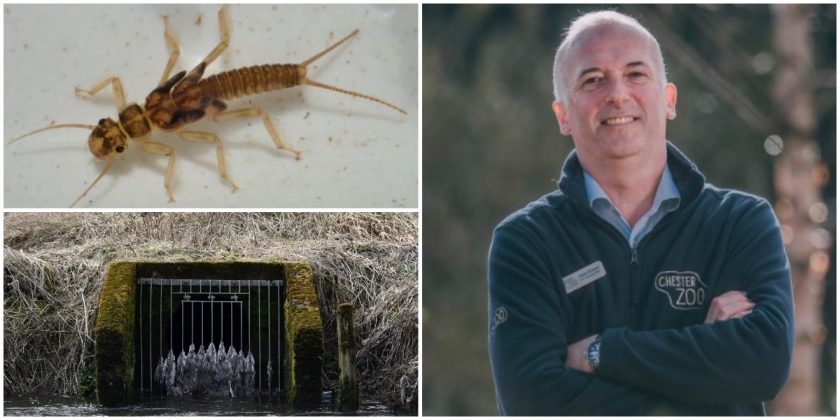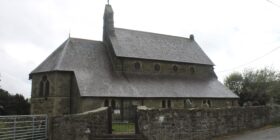Chester Zoo boss calls on Welsh Water to stop discharging sewage into River Dee

The boss of Chester Zoo has written to Welsh Water over the “unacceptable discharge” of sewage into the River Dee which is causing a “significant threat” to wildlife including a critically endangered insect species.
Chester Zoo is actively involved in conservation work to rescue the Scarce Yellow Sally Stonefly from the brink of extinction in the UK.
The endangered species was rediscovered in the UK in 2017 following a 22-year absence
The Scarce Yellow Sally Stonefly – which is only found in the River Dee – is one of the rarest stoneflies in the UK and Europe and its rediscovery is of international significance, being the westernmost point in Europe where the species is found.
Jamie Christon Chief Executive Officer of Chester Zoo also said sewage discharges into the River Dee present an ongoing threat to declining birds such as redshank, curlew, black-tailed godwit and pintail.
Last week a sewage discharge warning was triggered via a water quality map for a section of the River Dee between Eccleston and the Groves Chester.
Sewage warning along the River Dee between Eccleston and the Groves @ShitChester. https://t.co/9wkp1W2x0f pic.twitter.com/EdLVQE9v7T
— Ben Walker 🌹 (@BenWalkerUK) August 21, 2022
Surfers Against Sewage has created an interactive map tracking real-time CSOs (combined sewage overflows) and PRFs (pollution risk forecasts).
The map is part of the charity’s Safer Seas and Rivers Service.
Warnings are triggered when sewerage has entered the water within the last 48 hours.
Mr Christon has now written to his counterpart at Dwr Cymru/ Welsh Water, Peter Perry regarding the “unacceptable discharge of sewage” into the River Dee last week.
Mr Christon writes: “As you will know the River Dee is of international importance for biodiversity and a significant natural asset both locally and nationally.”
“Your discharge site is only a couple of miles upstream from the Dee Estuary Special Protection Area, Special Area of Conservation and Ramsar site.”
“These designations represent the international importance of the Dee estuary and lower river catchment for rare and declining birds such as redshank, curlew. black-tailed godwit and pintail as well as for declining habitats including saltmarsh, Atlantic salt meadows and mudflats.”
“As I am sure you can appreciate pollution of this environment puts these species and others at nsk and undermines the protection afforded.”
“The River Dee itself is covered by a number of SSSI designations on the English and Welsh stretches and hosts important populations of wildlife including declining invertebrates like the Scarce Yellow Stonefly which was rediscovered in the river in 2017.”
The River Dee is the only known site for this critically endangered species in the UK.
The letter goes on to say: “At Chester Zoo we are actively involved in conservation work to rescue the Scarce Yellow Stonefly from the brink of extinction in the UK.”
“Whilst we can provide help via our expertise in husbandry and conservation breeding at our Chester Zoo site, we are ultimately reliant on there being a clean and healthy environment along the river itself to allow a successful restoration of populations in the wild.”
“Along with many other aquatic invertebrates that support the aquatic food chain stoneflies require clean pollution-free conditions to thrive.”
“Sewage discharge at any point along the river presents a significant threat to these species and to those higher up the food chain such as fish and otters.”
Mr Christon’s letter says: “Whilst we understand the pressure that recent dry conditions place on our wastewater system, we believe that allowing discharge of untreated sewage is unnecessary given the alternatives available via Sustainable Drainage Systems which can be designed to manage stormwater locally.”
“We are currently supporting measures to establish more wetlands and drainage-friendly habitats along our Nature Recovery Corridor that follows the line of the Shropshire Union Canal from Ellesmere Port to Chester.”
“This is a partnership project with CWaC, the Land Trust at the Countess of Chester Country Park and Canal and River Trust amongst others, funded by the Green Recovery Challenge Fund.”
Mr Christon said: “We believe the current situation is totally unacceptable and would like to know what Dwr Cymru are doing to stop the discharge of sewage into the river at Chester both in the short term and as part of your long-term strategy for ensuring our waterways are clean and healthy.”
Welsh Water said:
“Combined Storm Overflows (CSOs) play a vital role in preventing homes being flooded following rain and storms because most of our network is a combined system that collects surface as well as wastewater. The operation of our CSOs – which mainly release surface water that enters our sewers due to rainfall – is highly regulated by our regulators.
“We are committed to providing information on the operation of our CSOs and publish this information on our website. We also notify interested parties, such as Surfers Against Sewage, of spills and this includes the CSO in the Chester area. This is included on their Safer Seas and Rivers app.
“To further improve the information on the operation of our CSOs we proposed to provide upstream and downstream information and we have been working to complete this. We have encountered some technical difficulties which has caused some delay, but we aim to have this completed as soon as possible.
“As a company we have also committed to launch an interactive web-based overflow map covering our operating area which will shortly be launched and by 2025 we will be able to report all CSO within an hour of them operating.
“We regularly carry out cleaning work on our sewers in the Groves area to ensure they are free of obstructions that can cause blockages which can reduce the capacity within our network. Chester also contains a large amount of impermeable area and with more intense rainfall we are seeing more and more surface water getting into the sewer network. We are working closely with the Local Authority in trying to manage that surface water and prevent it from entering the sewers in the first place.
“We are aware of the letter from Mr Christon at Chester Zoo and have already reached out to request a meeting”.
Spotted something? Got a story? Send a Facebook Message | A direct message on Twitter | Email: [email protected]
Latest News









